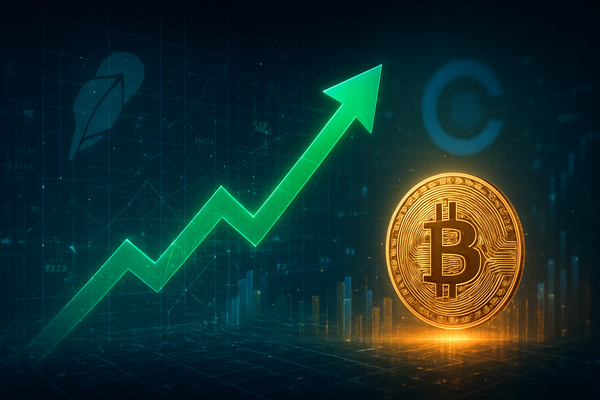The Looming Shadow: Investor Alarm Rings as Federal Reserve Independence Faces Unprecedented Challenge

The bedrock principle of Federal Reserve independence, a century-old safeguard against political meddling in monetary policy, is facing its most significant challenge in recent memory. Investor concerns have reached a fever pitch following former President Donald Trump's audacious attempt to dismiss Federal Reserve Governor Lisa Cook. This move, widely perceived as an assault on the central bank's autonomy, has sent ripples of uncertainty through financial markets, immediately impacting long-term yields and fueling worries about future inflation.
This high-stakes drama threatens to unravel the carefully constructed firewall between political expediency and sound economic policymaking. Should the Fed's ability to act independently be compromised, the implications could be profound, ranging from destabilized bond markets and a weakened U.S. dollar to a return of persistent, elevated inflation, forcing investors to recalibrate their strategies in a rapidly changing economic landscape.
A Battle for Autonomy: The Attempted Dismissal of Governor Cook and Its Wider Significance
On August 25, 2025, former President Donald Trump announced his intention to fire Federal Reserve Governor Lisa Cook, citing unsubstantiated allegations of mortgage fraud dating back to 2021, prior to her appointment to the board. Cook, who was initially nominated by President Joe Biden in January 2022 and reappointed for a full 14-year term in September 2023, vehemently denied the accusations and has refused to resign. Her legal counsel quickly initiated a lawsuit against the Trump administration, seeking an emergency injunction to block her removal and affirm her status as a Fed governor, arguing the claims are a "pretextual" attempt to undermine the Fed's independence and install a politically aligned appointee. This legal challenge is anticipated to escalate, potentially reaching the Supreme Court.
The timeline leading to this critical juncture highlights the escalating tension: Cook was confirmed by the Senate in May 2022, and again for a full term in September 2023. The accusations against her were reportedly brought forth by Bill Pulte, a Trump ally and director of the Federal Housing Finance Agency. Key players in this unfolding drama include President Donald Trump, Governor Lisa Cook, Bill Pulte, and the Federal Reserve System itself, whose spokesperson stated the institution would "abide by any court decision."
Initial market reactions were swift and concerning. U.S. stock markets experienced dips, and analysts warned that such an unprecedented move could "roil financial markets" and "undermine the credibility of the U.S. dollar." The significance for Federal Reserve independence cannot be overstated. The Federal Reserve Act of 1913 stipulates that governors can only be removed "for cause," a provision designed to insulate monetary policy from short-term political pressures. This attempted dismissal challenges that core principle, threatening to weaken the Fed's ability to maintain price stability and foster market confidence, potentially setting a dangerous precedent for future administrations.
Navigating the Volatility: Who Wins and Who Loses?
The prospect of a compromised Federal Reserve, coupled with higher long-term yields and shifting inflation expectations, creates a volatile environment that will inevitably produce winners and losers across various industries. Companies with high leverage or those heavily reliant on predictable, low borrowing costs are particularly vulnerable. Highly leveraged businesses, especially in capital-intensive sectors, will face increased interest expenses, eroding profit margins. Growth stocks, predominantly found in the technology sector (e.g., Apple Inc. (NASDAQ: AAPL), Microsoft Corp. (NASDAQ: MSFT)), which are valued on future earnings, will see their present value diminish as higher interest rates make distant cash flows less attractive.
On the losing side, real estate investment trusts (REITs) and housing-related companies like Lennar Corp. (NYSE: LEN) or D.R. Horton Inc. (NYSE: DHI) will grapple with rising mortgage rates, which stifle demand and transaction volumes. Utilities, such as Duke Energy Corp. (NYSE: DUK), are also sensitive to interest rates, often facing headwinds as borrowing costs increase. Companies with large, fixed-income portfolios could face significant "paper losses" as bond values decline when yields rise. Businesses with high input costs and limited pricing power, common in some consumer staples (e.g., Procter & Gamble Co. (NYSE: PG)) and utility sectors, will struggle to pass on increased expenses, squeezing profit margins in an inflationary environment.
Conversely, certain sectors and companies may find themselves in a more advantageous position. Financial institutions, including major banks like JPMorgan Chase & Co. (NYSE: JPM) and Bank of America Corp. (NYSE: BAC), generally benefit from higher interest rates as their net interest margins expand. Insurance companies like Berkshire Hathaway Inc. (NYSE: BRK.A) and investment firms also stand to gain. Cyclical industries, such as energy companies like Exxon Mobil Corp. (NYSE: XOM) and materials producers like BHP Group (NYSE: BHP), tend to outperform if higher yields signal stronger economic growth and can benefit from rising commodity prices during inflation.
Commodity producers, including gold miners like Newmont Corp. (NYSE: NEM) and other precious metals companies, typically thrive as investors seek safe-haven assets during economic uncertainty and as a hedge against inflation. Companies with strong pricing power and robust brands (e.g., Coca-Cola Co. (NYSE: KO)) are better positioned to maintain profit margins by passing on increased costs to consumers. Additionally, equity REITs that can adjust rents to inflation (e.g., Public Storage (NYSE: PSA)) may offer a hedge against rising prices, as real estate values generally appreciate during inflationary periods.
Broader Ripples: Industry Impact and Global Implications
The attempted interference with the Federal Reserve transcends a mere political spat; it represents a significant challenge to global financial stability and established institutional norms. The U.S. dollar's dominance as the world's primary reserve currency is inextricably linked to the perceived independence and reliability of American institutions, particularly the Fed. Any erosion of this confidence could lead foreign central banks and sovereign wealth funds to diversify away from dollar holdings, potentially diminishing America's "exorbitant privilege" in global finance and increasing borrowing costs worldwide. This aligns with a broader industry trend where populist leaders globally have questioned central bank mandates, threatening a general rollback of central bank autonomy established over the past five decades.
The ripple effects extend far beyond the U.S. borders. A politicized Fed could embolden political leaders in other nations to exert similar pressures on their own central banks, leading to a global erosion of central bank autonomy. This could hinder international coordination during economic crises and disproportionately impact emerging markets, which are highly vulnerable to shifts in global financial stability. The regulatory and policy implications are equally concerning; an inefficient, politicized monetary policy would struggle to achieve its dual mandate of maximum employment and price stability, potentially leading to "fiscal dominance" where government spending dictates monetary decisions, resulting in higher and more volatile inflation.
Historical precedents offer stark warnings. The most frequently cited U.S. example is President Richard Nixon's pressure on Fed Chair Arthur Burns in the 1970s to lower interest rates before the 1972 election, contributing significantly to the decade's rampant inflation. Internationally, examples like Turkey under President Erdoğan and Hungary under Viktor Orbán demonstrate how political interference directly led to hyperinflation and severe currency depreciation. These historical lessons underscore that central banks with greater political independence consistently achieve better inflation outcomes, making the current challenge to the Fed a perilous deviation from proven economic policy.
The Road Ahead: Navigating Uncertainty
The path forward for the Federal Reserve's independence, and consequently for the U.S. economy, is fraught with short-term legal battles and long-term uncertainties. In the immediate future, the legal challenge mounted by Governor Lisa Cook will be paramount. Its outcome will set a critical precedent for the limits of presidential power over Fed officials. Simultaneously, market participants will be keenly observing any further political rhetoric or actions regarding the Fed's monetary policy or personnel, assessing the extent of ongoing pressure. A 2025 survey indicating that 77% of economists are concerned about political interference underscores the gravity of the situation.
Long-term possibilities are more unsettling. An erosion of Federal Reserve independence could usher in a sustained period of higher and more volatile inflation, as monetary policy becomes susceptible to short-term political objectives rather than long-term economic stability. This scenario could severely undermine the U.S. dollar's global reserve currency status, triggering significant capital shifts away from U.S. assets. Investors should consider strategic pivots, prioritizing inflation-protected assets such as Treasury Inflation-Protected Securities (TIPS) and gold, which traditionally serve as safe havens. Diversifying currency exposure and increasing allocations to defensive equity sectors like healthcare and utilities may also offer resilience against heightened volatility.
Potential scenarios range from a successful upholding of the Fed's independence by the courts, leading to market stabilization and anchored inflation expectations, to a more drastic outcome where the Fed's structure is fundamentally altered, perhaps even brought under direct Treasury control. The latter, while less likely, could result in unchecked government spending financed by the central bank, leading to hyperinflation and severe economic instability. Continuous monitoring of central bank communications, legal developments, and global investor sentiment will be crucial for agile portfolio adjustments in an increasingly politicized monetary policy environment.
Conclusion: A Critical Juncture for the Financial World
The attempted dismissal of Federal Reserve Governor Lisa Cook by former President Donald Trump marks a critical juncture for the Federal Reserve's independence and, by extension, for the global financial system. The key takeaway from this event is the stark re-emergence of political challenges to an institution designed to be apolitical, threatening its ability to maintain price stability and foster market confidence. This situation highlights the delicate balance between democratic accountability and the operational autonomy essential for sound monetary policy.
Moving forward, the market will remain highly sensitive to developments in this legal and political saga. The ongoing legal battle, future political rhetoric, and the Fed's own September FOMC meeting will be pivotal in shaping market expectations for interest rates and inflation. The lasting impact could be profound: potentially higher inflation, increased borrowing costs, a weakened U.S. dollar, and amplified market volatility if the Fed's credibility is permanently damaged.
Investors should remain vigilant, closely monitoring economic data, legal outcomes, and central bank communications. Strategic adjustments focused on diversification, inflation protection (e.g., gold (COMEX: GC=F), TIPS), and careful consideration of interest-rate sensitive sectors will be paramount. The long-term significance of this moment lies in whether the U.S. can preserve the institutional integrity of its central bank, a cornerstone of its economic stability and global financial leadership. The financial world watches with bated breath to see if the Fed's independence, a vital bulwark against economic chaos, will endure.



